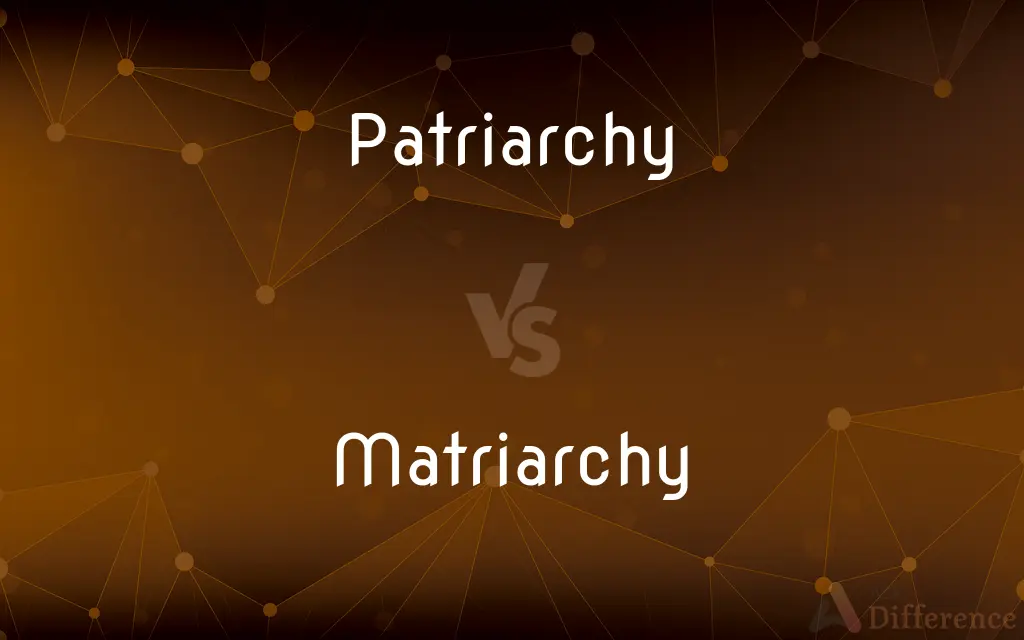Patriarchy vs. Matriarchy — What's the Difference?
Edited by Tayyaba Rehman — By Fiza Rafique — Updated on April 15, 2024
Patriarchy is a social system where men hold primary power, while matriarchy is a system where women dominate roles of political leadership, moral authority, and control.

Difference Between Patriarchy and Matriarchy
Table of Contents
ADVERTISEMENT
Key Differences
Patriarchy often centers around the control of men in positions of power within families and larger social systems, emphasizing male authority and predominance in various aspects of life. On the other hand, matriarchy involves women occupying roles of leadership and authority, thereby influencing social structure, norms, and values based on feminine perspectives.
In many patriarchal societies, males inherit property and titles, and hold leadership roles in religious and political spheres. Whereas in matriarchal societies, inheritance might follow the female line, and women predominantly manage community affairs and resources.
Cultural norms in patriarchal systems generally promote the idea of male superiority and decision-making power in both public and private spheres. Conversely, matriarchal cultures often celebrate female wisdom and leadership, fostering communities where women's decisions shape societal laws and ethics.
Patriarchy tends to enforce gender roles that restrict women to domestic and subordinate tasks. In contrast, matriarchy may encourage more egalitarian gender roles, with men and women sharing various social, economic, and familial responsibilities.
Economic structures under patriarchy typically emphasize male dominance in the workforce and leadership roles. On the other hand, matriarchal societies might promote economic equality more robustly, giving women equal or prioritized access to jobs and economic opportunities.
ADVERTISEMENT
Comparison Chart
Leadership
Dominated by men
Dominated by women
Inheritance
Typically patrilineal
Typically matrilineal
Cultural Norms
Male superiority
Female wisdom and leadership
Gender Roles
Restrictive for women
More egalitarian
Economic Control
Men hold more power and resources
Women have significant influence
Compare with Definitions
Patriarchy
A system of society or government where men hold the power and women are largely excluded from it.
Traditional patriarchal societies often restrict women’s political and economic roles.
Matriarchy
A societal structure that emphasizes women’s leadership in various sectors.
In matriarchies, women frequently control significant communal resources.
Patriarchy
A societal structure that values male authority over female authority.
Patriarchal values can be observed in the disproportionate number of men in leadership roles.
Matriarchy
A form of social organization in which women dominate in roles of political leadership and moral authority.
In some matriarchal societies, women lead family clans and make key decisions.
Patriarchy
A family, organization, or society controlled by men.
In many patriarchies, inheritance passes from father to son.
Matriarchy
A system where women, especially mothers, have the central role in authority.
Matriarchal communities might prioritize maternal lines in inheritance and succession.
Patriarchy
A social system that prioritizes male dominance in familial, religious, and social organizations.
Patriarchy often manifests in higher wages and better job opportunities for men.
Matriarchy
A society where women hold significant power, especially in creating and enforcing cultural norms.
Matriarchy often involves a strong respect for female elders.
Patriarchy
A system where men have authority over women in all aspects of society.
Patriarchal norms often dictate the careers and lifestyles women can pursue.
Matriarchy
A system where females govern, often in contrast to the traditional male leadership models.
Matriarchal structures are visible in some indigenous cultures around the world.
Patriarchy
Patriarchy is a social system in which men hold primary power and predominate in roles of political leadership, moral authority, social privilege and control of property. Some patriarchal societies are also patrilineal, meaning that property and title are inherited by the male lineage.
Matriarchy
Matriarchy is a social system in which women hold the primary power positions in roles of political leadership, moral authority, social privilege and control of property. While those definitions apply in general English, definitions specific to the disciplines of anthropology and feminism differ in some respects.
Patriarchy
A social system in which the father is the head of the family.
Matriarchy
A social system in which the mother is head of the family.
Patriarchy
A family, community, or society based on this system or governed by men.
Matriarchy
A family, community, or society based on this system or governed by women.
Patriarchy
Dominance of a society by men, or the values that uphold such dominance.
Matriarchy
The collection of women in positions of power, especially in such a social system or community. In all senses also called matriarchate.
Patriarchy
The collection of men in positions of power, exerting such dominance. In all senses also called patriarchate.
Matriarchy
A social system in which the mother is head of household, having authority over men and children.
Patriarchy
A social system in which the father is head of the household, having authority over women and children, and in which lineage is traced through the male line.
Matriarchy
A system of government by females (particularly as a kind of polity).
Patriarchy
A power structure in which men are dominant.
Matriarchy
The dominance of women in social or cultural systems.
Patriarchy
(Christianity) The office of a patriarch; a patriarchate.
Matriarchy
A form of social organization in which a female is the family head and title is traced through the female line
Patriarchy
The jurisdiction of a patriarch; patriarchship.
Patriarchy
Government by a patriarch; patriarchism.
Patriarchy
A form of social organization in which a male is the family head and title is traced through the male line
Common Curiosities
What defines a patriarchal society?
Patriarchal society is defined by its focus on male authority and leadership, particularly in political, social, and family structures.
What impact does patriarchy have on women’s rights?
Patriarchy often limits women’s rights and freedoms, restricting their roles in society and the workforce.
How does matriarchy impact social values?
Matriarchy often promotes values that emphasize community, cooperation, and the respect of women’s roles in society.
How does matriarchy differ from patriarchy in terms of inheritance?
In matriarchy, inheritance and succession are often matrilineal, whereas in patriarchy, they are typically patrilineal.
How do gender roles differ in patriarchal vs. matriarchal societies?
Patriarchal societies often have strict gender roles with men in dominant positions, while matriarchal societies tend to support more balanced roles between genders.
Are there any true matriarchal societies existing today?
Few societies are truly matriarchal, but some, like the Mosuo of China, display matriarchal characteristics in certain aspects of life.
Which societies are known for being matriarchal?
The Mosuo in China and the Minangkabau in Indonesia are known for their matriarchal structures.
Can a society be both patriarchal and matriarchal?
While some societies may exhibit traits of both, typically one dominates the cultural and social organization.
How does leadership function differently in matriarchies compared to patriarchies?
Leadership in matriarchies is often based on maternal lines of authority, contrasting the paternal focus in patriarchies.
Can a patriarchal society evolve into a matriarchy?
A society can evolve in many ways, including moving from patriarchal to more matriarchal structures, often through shifts in cultural norms and values.
What is the role of men in matriarchal societies?
Men in matriarchal societies often engage in roles that are supportive and sometimes secondary to the roles of women.
What are examples of patriarchal practices?
Examples include male-only inheritance and predominance of men in leadership positions in politics and business.
Do matriarchal societies offer better gender equality?
Matriarchal societies often have structures that promote more gender equality than patriarchal societies.
What are the psychological impacts of growing up in a patriarchal society?
Individuals in patriarchal societies may experience pressures and limitations based on strict gender roles and expectations.
How does patriarchy affect economic structures?
In patriarchal societies, men are often seen as the primary earners, influencing economic disparities and opportunities.
Share Your Discovery

Previous Comparison
Trackball vs. Mouse
Next Comparison
Trench vs. SapAuthor Spotlight
Written by
Fiza RafiqueFiza Rafique is a skilled content writer at AskDifference.com, where she meticulously refines and enhances written pieces. Drawing from her vast editorial expertise, Fiza ensures clarity, accuracy, and precision in every article. Passionate about language, she continually seeks to elevate the quality of content for readers worldwide.
Edited by
Tayyaba RehmanTayyaba Rehman is a distinguished writer, currently serving as a primary contributor to askdifference.com. As a researcher in semantics and etymology, Tayyaba's passion for the complexity of languages and their distinctions has found a perfect home on the platform. Tayyaba delves into the intricacies of language, distinguishing between commonly confused words and phrases, thereby providing clarity for readers worldwide.















































